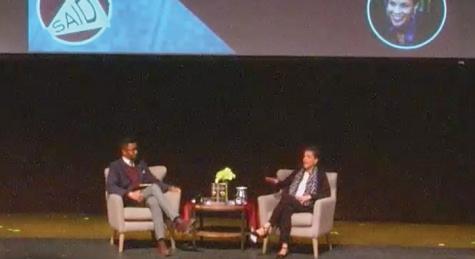
3 minute read
Risa Kitagawa: Redirecting National Narratives
RISA KITAGAWA
Advertisement
Assistant Professor, Department of Political Science, International Affairs Program
College of Social Sciences and Humanities
The project that I worked on during my Humanities Center Fellowship year investigated how truth commissions are
used to reckon with past violence. Truth commissions — fact-finding bodies that provide a public forum for “truth-telling” to uncover a history of human rights abuses — are a ubiquitous feature of societies emerging from political violence. They are often credited with promoting national reconciliation. So goes Desmond Tutu’s adage, popularized by South Africa’s 1995 Truth and Reconciliation Commission as the state emerged from apartheid: “there is no healing without truth.” Despite this often sanguine view of truth-telling, we still have much to learn about whether these commissions do indeed help reunite a society where state-led violence has all but destroyed social and political trust. To what extent does “truth-telling” forge consensus around some historical truth? Are citizens equally prepared to reconcile with one another? And do they agree on what “justice” entails?
Addressing such questions required a sustained look into the testimonies collected by truth commissions. Offered by survivors, perpetrators, and witnesses of gross human rights abuses, these intimate testimonies provide a novel source of data to explore public opinion. Over the course of the fellowship, I scraped tens of thousands of truth commission records in Sub-Saharan Africa to create an original digital corpus of testimonies and analyzed this content using automated text analysis methods. My initial findings from Sierra Leone and Kenya indicate a great deal of heterogeneity in citizens’ views about violence, justice, reconciliation, and societal needs. This depends in part on the roles that individuals played during the conflict, but also underscores how deep-rooted inequalities across social groups, such as gender and ethnicity, shape preferences about accountability and reconciliation. These findings contrast markedly with the way global policy circles currently portray truth commissions. Far from being a unifying initiative, the much messier reality is that these forums are a site of contestation and competing narratives about what justice requires.
My project owes its existence to my cohort of Fellows and the clear-eyed guidance of Lori Lefkovitz. Our cohort hailed from chemistry, criminology, history, literature, philosophy, and political science, and from different stages in our professional careers. This multilevel diversity was a unique strength of the Fellowship program. Every week, I left the room having learned something new, and with a hint for my own work. Politics lives in the spoken and written word, and there is a lot of it; the challenge for political scientists is to make sense of this enormous volume of text without losing its meaning in the numbers and statistics. In this, I am indebted to the Fellows, particularly in the humanities, who pushed me to think seriously about the normative and affective content of the powerful testimonies I was processing. As a result, while my data collection began with modest goals, it is now part of an ongoing, much broader research project. By leveraging recent advances in text analysis methods, it may eventually aid practitioners and policymakers with synthesizing and designing better policies out of the vast amounts of information that truth commissions produce. That there was, among others, a biographer, a chemist, and a moral philosopher in the early life of this project speaks to what can come from scholars getting together over lunch, and over conventional disciplinary divides, to talk big ideas.
2019-2020 FELLOWS
Ekaterina Botchkovar
Associate Professor, School of Criminology and Criminal Justice
College of Social Sciences and Humanities War Exposure and Degradation of Morality: The Case of Ukraine
Matthew Bowser
Ph.D. Candidate, Department of History
College of Social Sciences and Humanities Misdirected Rage: The Anti-Immigrant Response to Co-Colonialism and Capitalism in Myanmar and the Origins of Burmese Islamophobia, 1930–1947
Risa Kitagawa
Assistant Professor, Department of Political Science, International Affairs Program
College of Social Sciences and Humanities Recasting National Narratives: A Text Analysis of Truth Commission Testimonies
Patricia Mabrouk
Professor, Department of Chemistry
College of Science Them and Us: The Impact of Power and Privilege on Chemistry Doctoral Students’ Ethical Decision Making about Authorship
Candice Delmas
Associate Professor, Department of Philosophy and Religion, Department of Political Science
College of Social Sciences and Humanities Resistance from the Margins
Carla Kaplan
Distinguished Professor, Department of English
College of Social Sciences and Humanities Queen of the Muckrakers: Jessica Mitford and the Arts of Activism
Julia (Summer) Marion
Ph.D. Candidate, Department of Political Science
College of Social Sciences and Humanities Purchasing Power? Philanthropy and Policy Influence in Global Governance
William Miles
Professor, Department of Political Science
College of Social Sciences and Humanities Faith-Based Subversion of Western Democracy










